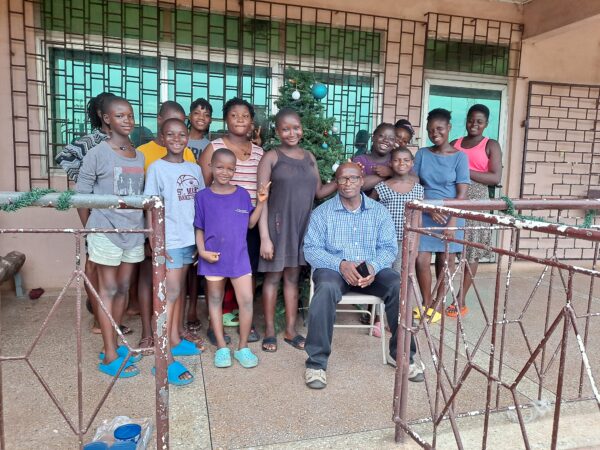Orphanages are a terrible business model. Every parent knows that children are expensive. If we believe that child labor is a generally bad thing and children should be in school, then there is no direct income stream for an orphanage outside of government support and charitable giving. Peter, the founder of St. Bakhita Foundation Orphanage, did not set out to start an orphanage, but he did set out to make a difference in the lives of the vulnerable. Here is the St. Bakhita Foundation origin story.
An Orphan Helping the Vulnerable
Peter himself is an orphan of the political unrest that racked Ghana in the late 1970s and early 1980s. He credits the Marine Security Guards at the U. S. Embassy for his rescue from the streets. He was taken in, adopted, and given a safe place to grow. His mother instilled in him the responsibility to care for those more vulnerable than he. She showed him how the women and young girls of the country were often the most vulnerable. So, when he found work in Accra and had a little money, he began looking for ways to help.
He started by talking to the homeless women and prostitutes where they congregated at Togo Circle. Once a week, he would talk to them about his story and offer to rescue them from the streets through education in a trade. I imagine the skepticism of these women as a young man appeared with promises of a place to live and schooling in return for nothing. One young woman weighed the risks of her current situation with the risks of the unknown and took him up on the offer. Peter rented a room for Nancy and paid for her school.
An Orphanage in a Rented Room
During this time, he also taught at a Bible Study. People there heard of his good works and told him of a girl mistreated and kept from school by her stepmother. Peter went to the woman and offered to pay the fees for the little girl, eight at the time, and the woman accepted. However, when Peter checked up on the girl at the school, he discovered that the fees had never been paid and the girl had not been attending.
He visited the home and learned from others there that the girl was sleeping on the streets. Her father was addicted to drugs and her stepmother was either unable or uninterested in caring for the girl. Peter asked if he could take the girl to live with Nancy. The family did not protest. That was probably the start of St. Bakhita Orphanage, one little girl living with a young woman rescued from the street.
Not long after, someone in the community told him of two sisters living in Kasoa – not far from Accra. Their parents had gone to Lagos, Nigeria in search of work and left the girls behind with a friend. Landguards, landguards, unregulated, armed security guards employed by people whose property is under contention, were harassing the girls. The friend who was watching the girls said that they could not to protect the girls and asked if Peter could take them to Nancy – and so they were four in the little room.
Orphanage Built by Word of Mouth
Then someone told him about the twins. The two girls were living in Buduburam, a refugee camp not far from Accra, separated from their parents with no one to protect them. Word had gotten around about Peter–Word that he rescued little girls, that he had a place and a woman to take care of them, that he sent them to school. He received the call and took them in, too.
Each time someone from the community called, Peter answered. One by one and sometimes two by two, the girls arrived. He had been continuing to help young women pay for schooling – a nurse, a businesswoman. Portia, who graduated with a degree in business administration, now runs the day to day operations and takes care of the girls.
St. Bakhita Foundation Orphanage

St. Bakhita Foundation Orphanage started with a young woman and a little girl. Now it is a registered non-governmental organization (NGO) dedicated to raising vulnerable girls and empowering them through education to become forces for good within their communities. In their 10 years of operation, you can see the success.
The twins are in their second year of university. Two more St. Bakhita girls began university in January. Four others are working on applications or taking extra work to apply for university, nursing programs and apprenticeships. Nine girls are in high school and 16 are in primary school.
Peter has had to stop taking on new girls because money is tight and he knows he has to fulfill his promise to those he already has. In addition to his own paycheck, Peter funds St. Bakhita Foundation Orphanage on prayers. Though, Peter is devout and many of the girls regularly attend services and singing the choir, the orphanage has no affiliation to a church. Every now and again, Peter finds a benefactor—an American posted at the Embassy or otherwise living in Accra, a local business owner willing to provide goods on credit, a sympathetic headmaster who sees what the orphanage is accomplishing, or other generous Ghanaians who give when they can. The funding has been inconsistent and not nearly enough. I believe in prayers, but I also believe in a plan. While I am working on the plan, we need help because orphanages are a terrible business model.
